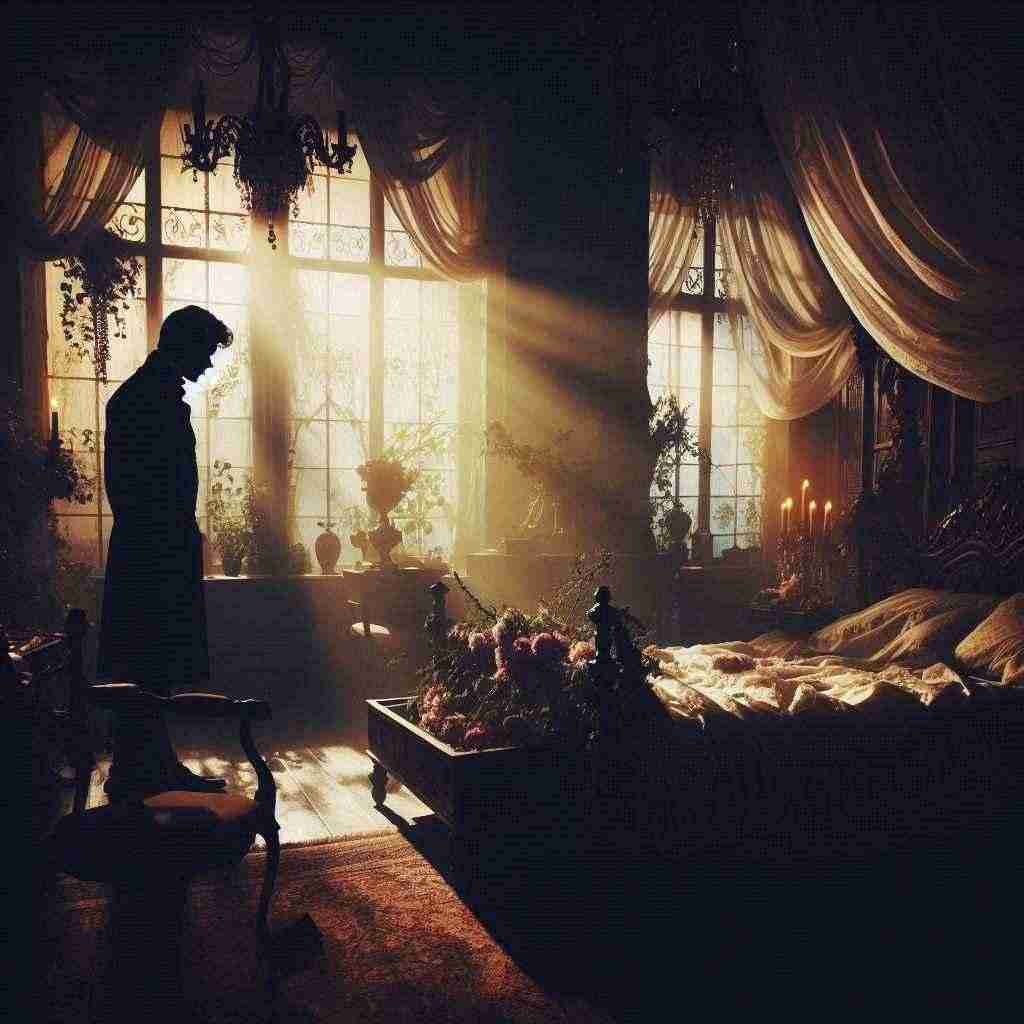After Death
Christina Rossetti
1830 to 1894

Want to track your favorites? Reopen or create a unique username. No personal details are required!
The curtains were half drawn, the floor was swept
And strewn with rushes, rosemary and may
Lay thick upon the bed on which I lay,
Where through the lattice ivy-shadows crept.
He leaned above me, thinking that I slept
And could not hear him; but I heard him say,
‘Poor child, poor child’: and as he turned away
Came a deep silence, and I knew he wept.
He did not touch the shroud, or raise the fold
That hid my face, or take my hand in his,
Or ruffle the smooth pillows for my head:
He did not love me living; but once dead
He pitied me; and very sweet it is
To know he still is warm though I am cold.
Christina Rossetti's After Death
Christina Rossetti's sonnet "After Death" presents a haunting tableau of a deceased speaker observing the reactions of a living person, presumably a former lover, as he stands by her deathbed. Through this unconventional perspective, Rossetti explores themes of death, love, regret, and the complexities of human emotion, all while challenging traditional notions of consciousness and the boundary between life and death.
The poem's structure, a Petrarchan sonnet, is significant in its exploration of love and loss. The octave sets the scene with vivid sensory details, creating a somber atmosphere that emphasizes the physical reality of death. The sestet then shifts to a more introspective tone, focusing on the emotional core of the poem: the complex relationship between the speaker and the man by her bedside.
Rossetti's use of imagery is particularly striking in the octave. The "half drawn" curtains suggest a liminal space between life and death, while the "rushes, rosemary and may" strewn on the floor and bed evoke traditional funerary customs. These herbs, often associated with remembrance and sorrow, underscore the mournful atmosphere. The "ivy-shadows" creeping through the lattice add a gothic touch, reinforcing the poem's preoccupation with death and the passage of time.
The speaker's unusual state of consciousness - aware yet perceived as sleeping or dead - creates a sense of dramatic irony. This device allows Rossetti to explore the gap between appearance and reality, as well as the things left unsaid in relationships. The man's whispered words, "Poor child, poor child," and his subsequent weeping reveal a depth of feeling that was apparently absent during the speaker's life.
The volta, or turn, occurs at the beginning of the sestet, marked by a shift from description to reflection. The speaker notes the man's restraint - he does not touch her or disturb her repose - which could be interpreted as respect for the dead or as a continuation of the emotional distance that characterized their relationship while she lived. This restraint contrasts sharply with the emotional release of his tears, highlighting the complexity of human emotions in the face of death.
The final three lines of the poem deliver a poignant reflection on love, regret, and the nature of human connection. The speaker's observation that "He did not love me living; but once dead / He pitied me" suggests a bittersweet satisfaction in finally eliciting an emotional response from the man, even if it comes too late. The use of "pitied" rather than "loved" is telling, implying that even in death, the speaker does not receive the depth of feeling she perhaps longed for in life.
The poem's concluding line, "To know he still is warm though I am cold," is particularly powerful. It encapsulates the central irony of the poem - that death has brought about a kind of emotional intimacy that was lacking in life. The juxtaposition of "warm" and "cold" not only refers to the physical states of the living and the dead but also suggests an emotional thawing in the man contrasted with the speaker's newfound detachment.
Rossetti's choice to give voice to a dead speaker challenges conventional narratives about death and consciousness. This perspective allows for a unique exploration of the aftermath of death and its impact on the living. It also raises questions about the nature of love, regret, and the human tendency to value what is lost.
In conclusion, "After Death" is a masterful exploration of death, love, and human emotion. Through its unconventional perspective, vivid imagery, and skillful use of the sonnet form, Rossetti creates a poem that is both deeply personal and universally resonant. The poem invites readers to contemplate the complexities of human relationships, the regrets we carry, and the transformative power of death in shaping our perceptions of others. Ultimately, it suggests that understanding and connection might sometimes come too late, leaving us with the bittersweet comfort of posthumous recognition.
This text was generated by AI and is for reference only. Learn more

